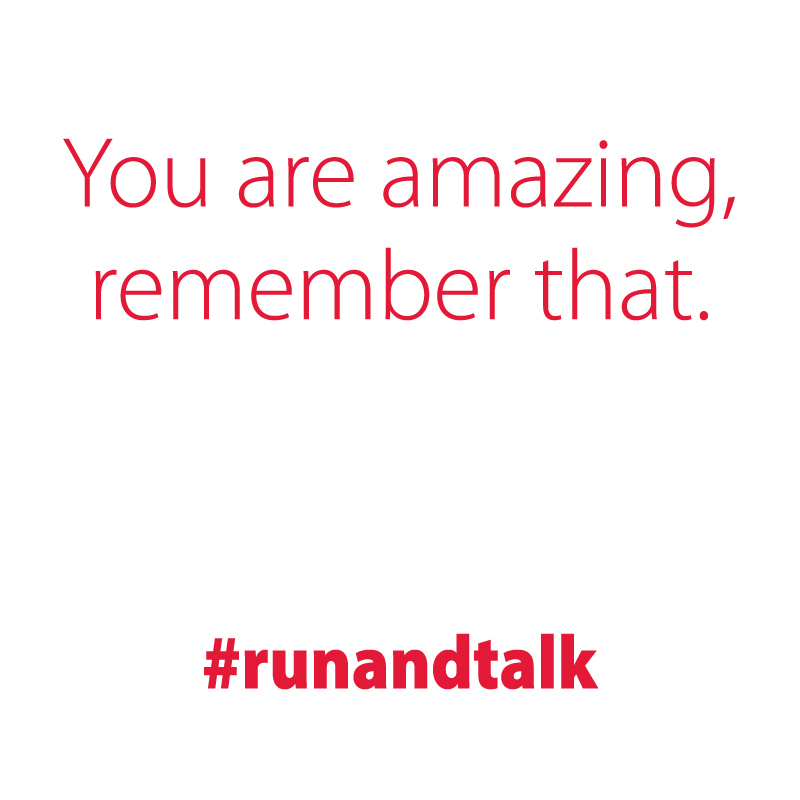Even as a doctor, I had no concept of the power that exercise has to improve and maintain mental wellbeing until I experienced it myself. When I started running it was to get fit and lose a bit of weight after having three children. I knew that regular exercise would do the trick. What I didn’t realise was that ten years later, my main reason for running wouldn’t be so I could eat cake or keep up with my kids. My reason to run has changed. I now run more for my mental health than my physical health. This is why I was delighted when England Athletics, asked me to support their #runandtalk campaign in conjunction with the mental health charity Mind.
Mind reports that 1 in 4 people in the UK will experience a mental health problem each year and that in England, 1 in 6 people report experiencing a common health problem, such as anxiety or depression, in any given week.
These are huge stats. These problems affect so many of us, so why are we so reluctant to talk about our mental health?
Mental health is just as important as physical health but many people still have the view that struggling with your mental health is a sign of weakness. It isn’t. It’s called being human. Anyone can be affected by mental health issues; it’s no reflection on your intelligence, status or personality. As a GP I have seen people of all ages, from all backgrounds with a whole range of mental health problems. So many of them are confused as to why they feel the way they do:
“I don’t understand it, I don’t have anything to be depressed about doctor.”
“I just don’t know why I keep feeling so anxious, nothing bad has happened.”
Mental health conditions can be triggered by negative life events such as bereavement, redundancy and divorce but often there is no clear reason and that can be so hard to understand. Opening up and admitting that you don’t feel yourself or that you aren’t coping well with daily life can be a really hard thing to do.
Running can help in a number of ways:
- Running is medicine. When you exercise, your brain releases endorphins. These promote a feeling of happiness and wellbeing. With a vigorous or prolonged run they may even induce a euphoria, also known as the runner’s high. Exercise has been proven to be an effective treatment in mild to moderate depression. It’s also a great way to relieve stress, calm and invigorate yourself.
- Running is achievable. One of the barriers to exercise can be a lack of motivation, this is especially true if you have depression. It can be so hard to make yourself exercise, even though you know it will help you. You don’t need to plan ahead and make special arrangements for a run. You don’t need any new skills. You can do it any time and anywhere, just put on your trainers and put one foot in front of the other – slowly at first.
- Running is sociable. If your mood is low or your anxiety levels are high, then you may feel antisocial and prefer to exercise alone. That is fine but we know that running in a group gives extra benefits. You’ll find support for your running and a chance to #runandtalk but also help with motivation and new friends too. Somehow it’s much easier to talk about your feelings if you are side by side than if you are directly looking at someone – try it.
- Running builds self esteem. It’s easy to feel like a failure, as if you are no good at anything and to completely lose your confidence if you have a mental health problem. If you can set yourself a small goal and you reach it then you feel proud of yourself, more positive and empowered to set yourself another target. Running is ideal for this because you can break it down into chunks, either time running, distance run or number of runs a week. The great thing is that if you are consistent, you WILL improve. It’s particularly empowering if you have never run before and never thought you could – you’ll quickly discover that you CAN. Your confidence will soar. Look for a race or fun run as a target. Don’t forget to reward yourself when you reach each goal.
- Running is for life. It’s never too late to start running. You’re never too old. You don’t have to go far or fast, you just have to go. Once you establish it as part of your weekly routine you will wonder how you managed without it, I certainly do! It will become one of your secret weapons for keeping you on track both physically and mentally.
“You’ll run on your own and talk to yourself. You’ll run with a friend and put the world to rights. You’ll run in a group and laugh your head off. Whichever you choose, it’s good to #runandtalk.”
Dr Juliet McGrattan
Through the week commencing 27th January and on Time to Talk day on 1st February. England Athletics and Mind are encouraging us all to #runandtalk. Just run a mile, further if you want, and talk to friends, family or other runners. There are organised runs that you can attend too. Let’s break the stigma of mental illness and just get talking about how we really feel.









It is so hard to go for a run when you cannot face leaving your bed and tears are streaming down your face. Forcing yourself to go out does really help, it helps you in so many ways. I could never face people so headed out into the countryside. Noticing nature somehow calmed me. I suppose it took my mind away from me, but in a really good way. It gave me hope. My family are really good now and will force me out of the door if they see that I am a bit low. I never regret it.
This is such an important event, whenever I opened up to my friends they often also talked about their experiences. Let’s get mental health issues into the main stream. Xxx
Thank you for sharing that. Hearing from someone who really understands will help others xx
Love this! So very true. I always feel happier and calmer when I’ve been for a run and I can’t recommend it enough to other people. I’ve got most of my family running, but a lot of my friends still think I’m crazy and won’t give it a go.
They’ll get there if they want to- don’t give up trying!